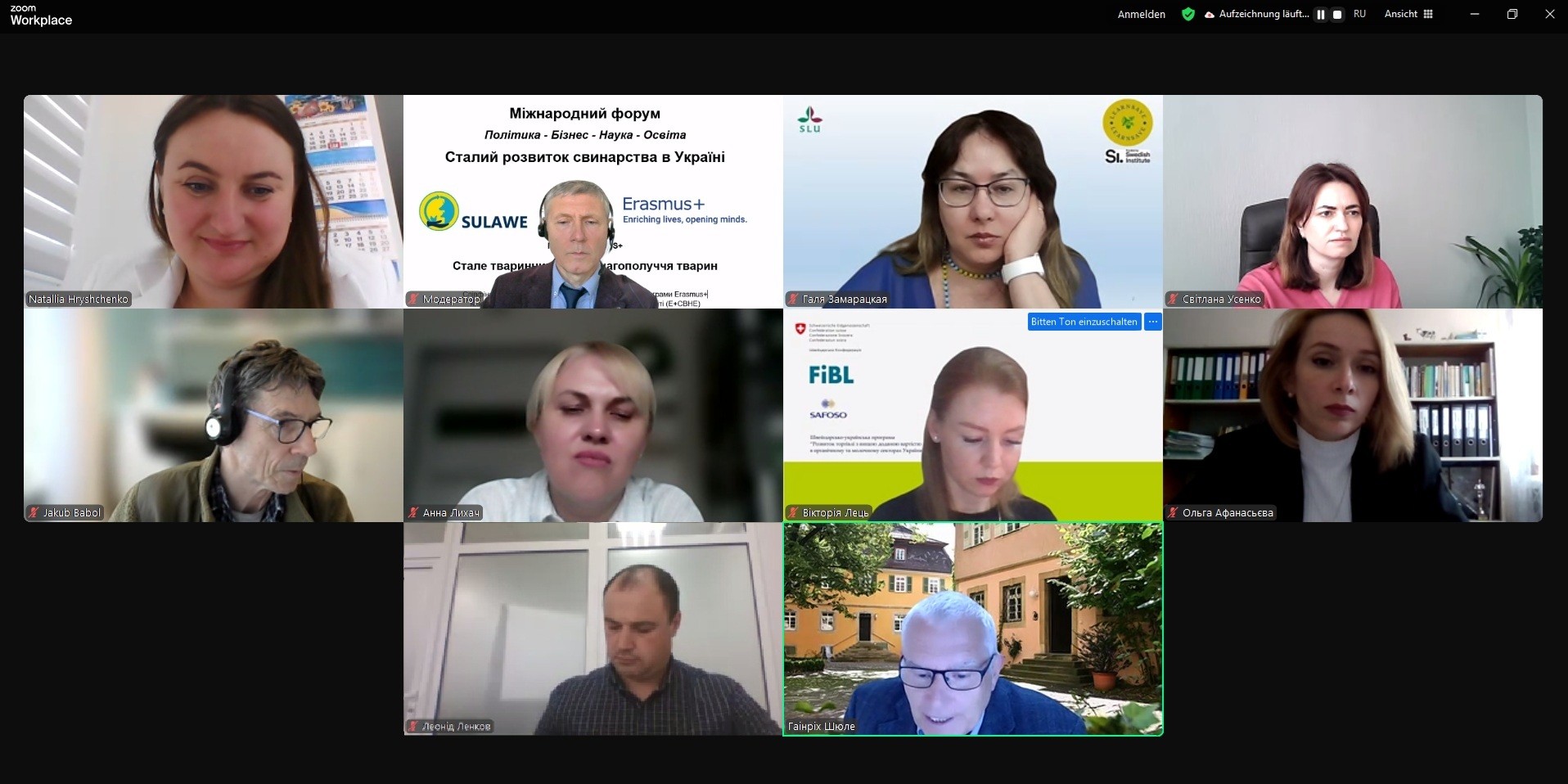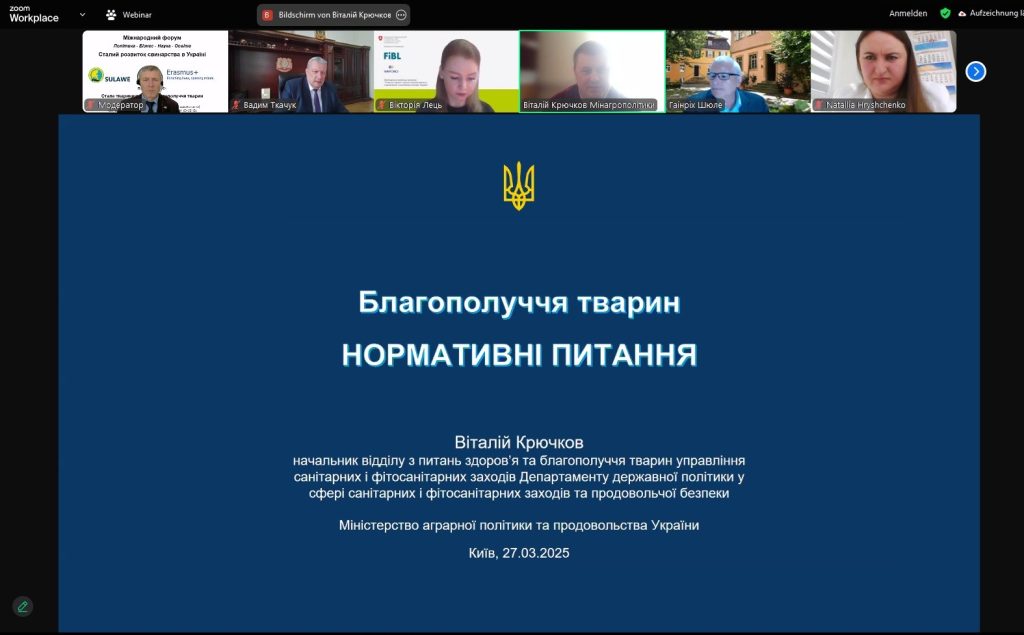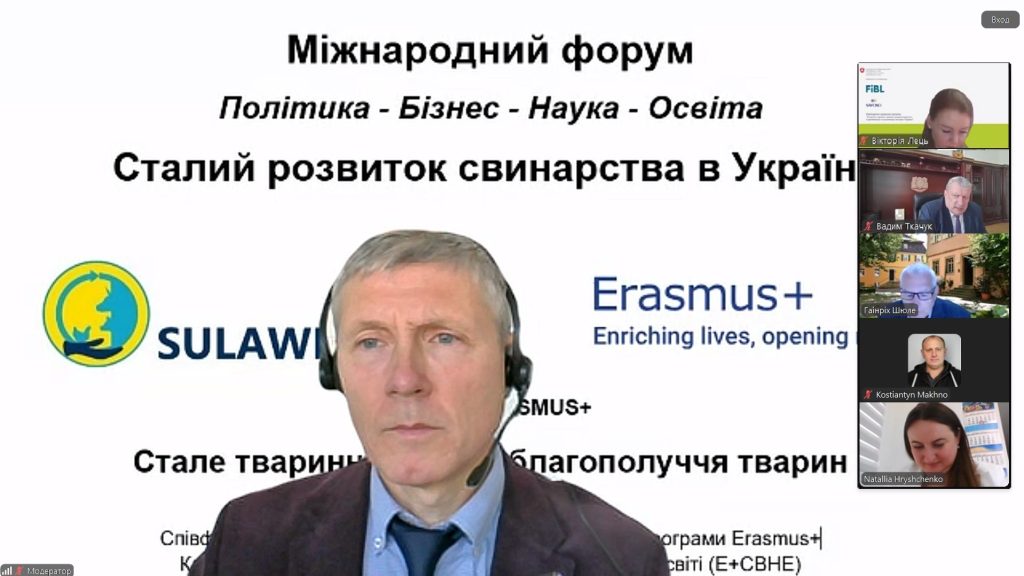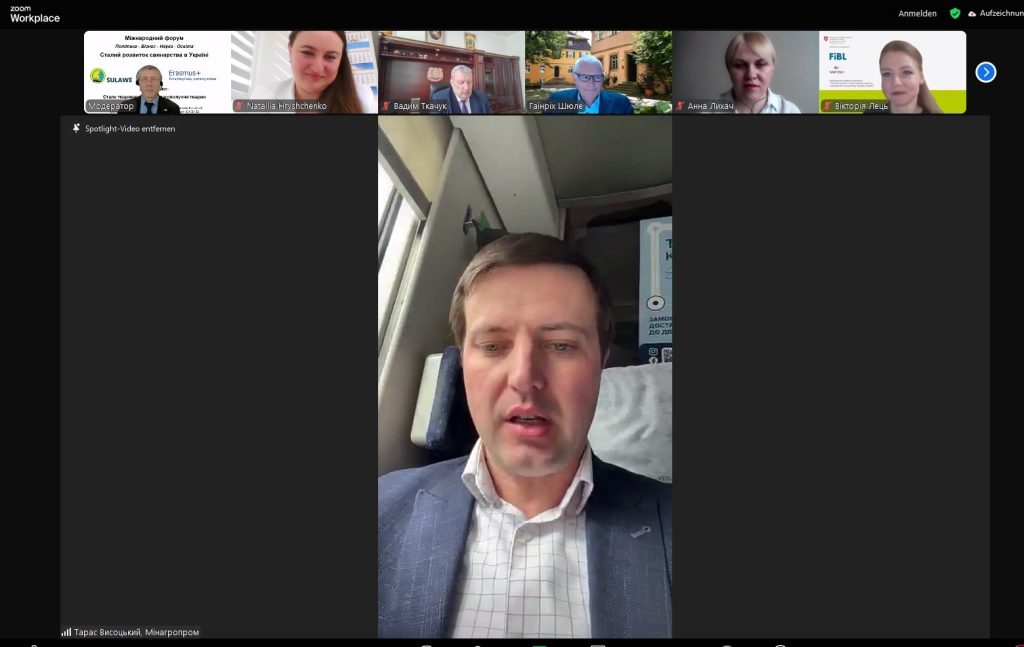The International Online Conference “Politics – Business – Science – Education: Sustainable Pig Farming in Ukraine”

The conference „Sustainable Pig Farming in Ukraine“ was held on 27th March 2025 with the aimof highlighting relevant issues of sustainable pig farming and animal welfare that are important for understanding current trends and future developments in the industry.
The forum was attended by teaching staff from 5 universities (PSAU, LNUVMB, NUBiP, V.Dahl EUU and Sumy NAU), as well as by representatives from SMC VFPO, Association of Ukrainian Pig Breeders, EU project “Eurogroup for Animals”, GFA Consulting Group GmbH, 4 agricultural colleges, Institute of Animal Breeding and Genetics, Institute of Agricultural Economics, Institute of Pig Breeding and AP (all National Academy of Agricultural Sciences of Ukraine), SLU, and various pig farms.
In total 133 persons participated at the conference. Among them were 80 representatives of university teaching staff and 4 teachers from agrarian colleges, 12 PhD-students, 23 students of the universities and 3 scientists. The event was also attended by 8 representatives of different business operators, 2 participants of international projects and 1 media representative. In general, in addition to the SuLAWe project participants, representatives of 2 other EU projects were invited to participate in the forum: QFTP and FABU.
The Rector of NUBiP, Professor Dr. Vadym Tkachuk, welcomed the conference participants and emphasised the role of educational institutions in providing the agricultural sector with the necessary specialists and the importance of developing a network of experts in cooperation within international projects.
Prof. Dr Heinrich Schüle, Dean of the Faculty of Agricultural Economics at the HfWU (Germany), highlighted the role of ERASMUS+ projects, and in particular the SuLAWe project, in improving the educational content of agricultural HEI in Ukraine, deepening cooperation between EU and Ukrainian universities, and developing Lifelong Learning courses for working adults on sustainability and animal welfare.
The conference agenda was structured to ensure accessible and understandable presentation of
information to the participants. Each speaker was given 20 minutes, 15 minutes for presentation and 5 minutes for questions. Structurally, the conference was divided into 3 sessions and a panel discussion. The first session covered the most important issues of the pig industry, the second session covered issues important for all European countries and the third session covered issues typical for Ukraine. Each session was attended by the representatives of the Ukrainian pig industry.
Representatives of Ukrainian and foreign educational institutions were invited to the panel
discussion. It is worth noting that both university and college teaching staff was present, which is not typical for ERASMUS events. However, given the importance of all stakeholders in the educational process for the training of pig welfare specialists, we consider this practice to be justified.
The list of speakers was included in the program sent to participants upon registration. The
presentations are published on the SuLAWe project website with the consent of the participants.In fact, everyone can find the professional contacts of each of the speakers. As a result of the conference, it was discussed and planned to conduct a study of animal behaviour on the PACL farm together with a Ukrainian company that manufactures equipment for remote monitoring of animal behaviour on the farm. We believe there will be more such examples, but their monitoring is beyond the scope of the conference.
The key partners in organising the conference were the Ministry of Agrarian Policy and Food of Ukraine and the Association of Ukrainian Pig Breeders. The Ministry provided political support and highlighted Ukraine’s strategic plans for implementing welfare principles in pig production. The Association of Ukrainian Pig Breeders highlighted the consolidated position of domestic producers on the issues raised. For their part, the universities demonstrated how the training modules developed in the project are already being used and can be used in the future to train animal welfare specialists, both in the field of 211 “Veterinary medicine” and in the field of 204 “Technology of production and processing of products of animal origin”.
In addition, the experience of other international projects helping Ukraine to implement EU
requirements was also highlighted.
The output of the project direct linking the interests of producers, the Ministry and educational institutions is the short training course based on the Long-Life Learning (LLL) principle, which were developed within the project and partially tested in 4 pilot universities.
During the conference, all of the above-mentioned stakeholders were given the opportunity to
provide information to the conference participants. Moreover, the participants exchanged expert opinions and debated key issues during the panel discussion.
Overall, the conference proceeded according to the planned program. All the announced experts were present, including those who had been invited to give a welcome address. The event was held in one day, which was similar to previous conferences organised within the SuLAWe project.



